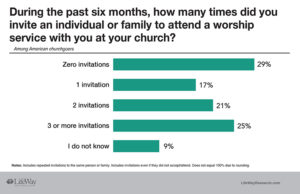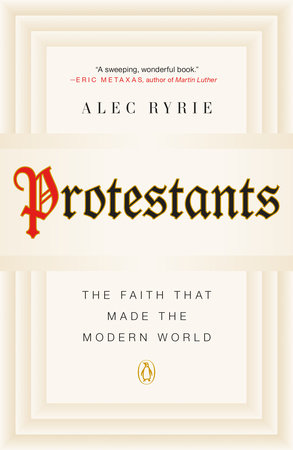NASHVILLE, Tenn.—Most American Protestants like to invite their friends to church—at least once in a while.
Nearly two-thirds of Protestant churchgoers say they’ve invited at least one person to visit their church in the past six months, according to a new report from Nashville-based LifeWay Research.
“It’s a fairly easy thing for churchgoers to do,” said Scott McConnell, executive director of LifeWay Research. “In any six-month stretch, there are major Christian holidays and often other special events that are perfect occasions for churchgoers to invite friends and acquaintances.”
Church invitations fairly common
For the study, LifeWay Research surveyed 1,010 Americans who attend a Protestant or nondenominational church at least once a month.
 Researchers asked churchgoers how often they’d invited an individual or a family to attend a worship service with them at their church in the last six months. They could include repeated invitations to the same people. Invitations counted even if they were turned down.
Researchers asked churchgoers how often they’d invited an individual or a family to attend a worship service with them at their church in the last six months. They could include repeated invitations to the same people. Invitations counted even if they were turned down.
Seventeen percent say they extended an invitation. Twenty-one percent extended two invitations, while 25 percent extended three or more. Nine percent say they don’t know how many invitations they extended.
Three out of 10 say they didn’t invite anyone (29 percent).
“That’s a pretty substantial number,” said McConnell. “For a number of churchgoers, inviting people to church isn’t on their radar.”
Church invitations are harder to come by in some parts of the country. Forty-two percent of churchgoers in the Northeast say they hadn’t invited anyone, while 37 percent of Midwesterners skipped the invitations. By contrast, only 24 percent of Southerners and 26 percent of those in the West say they hadn’t invited anyone.
Sign up for our weekly edition and get all our headlines in your inbox on Thursdays
Invitation rates vary by denomination
Churchgoers who attend Assemblies of God or other Pentecostal churches (71 percent) and those who attend non-denominational churches (69 percent) are more likely to say they invited at least one person to church. Lutherans (55 percent) and Methodists (53 percent) are less likely.
Forty-three percent of Methodists say they had not invited anyone, as did 41 percent of Lutherans. Fewer nondenominational (20 percent), Baptist (22 percent) or Assemblies of God/Pentecostal (23 percent) churchgoers skipped invitations.
Churchgoers who are Baptist (31 percent) or Assemblies of God/Pentecostal (30 percent) are more likely to have invited three or more people than Lutherans (17 percent) or Methodists (15 percent).
Not surprisingly, the more often people go to church, the more likely they are to invite someone to go along. Twenty-seven percent of people who attend at least once a week had invited three or more people. That drops to 10 percent for those who attended once or twice a month.
Almost half of those who attend services once or twice a month had not invited anyone to go with them (46 percent). By contrast, 26 percent of people who attend at least once a week had not invited anyone.
Inviting people not top of mind
Researchers also asked churchgoers why they didn’t bring more people to church with them.
 It’s a natural question since most congregations want more people to experience Christian community, and they want more people to have a relationship with Jesus, McConnell said.
It’s a natural question since most congregations want more people to experience Christian community, and they want more people to have a relationship with Jesus, McConnell said.
“Inviting people to church should be commonplace,” he said. “Still, some churchgoers don’t put much thought into inviting others.”
When asked why they don’t invite more people, 31 percent say, “I don’t know why.” Twenty percent say people have refused their invitation. Seventeen percent say they don’t know anyone to invite, while 11 percent say they aren’t comfortable asking people to come to church.
Only 4 percent say inviting people isn’t their job.
McConnell said he’s a bit concerned with people who say they don’t know anyone to invite.
“That’s problematic,” he said. “There are a small but significant number of churchgoers who seem to have no contact with people who don’t go to church.”
McConnell is not surprised to find that people turn down invitations to come to church. A 2016 LifeWay Research study found only a third of unchurched people said they were likely to come to a church worship service if invited (35 percent).
“In today’s culture, you might be inviting someone to attend a church service for the first time in their lives,” he said. “Communicating the value of why a churchgoer attends is going to take some time.”
LifeWay Research conducted the study Aug. 22–30, 2017. The survey was conducted using the web-enabled KnowledgePanel, a probability-based panel designed to be representative of the U.S. population. Initially, participants are chosen scientifically by a random selection of telephone numbers and residential addresses.
Analysts used sample stratification and base weights for gender, age, race/ethnicity, region, metro/non-metro, home ownership, education and income to reflect the most recent U.S. Census data. Study-specific weights included for gender by age, race/ethnicity, region and education.
The completed sample is 1,010 surveys, which provides 95 percent confidence the sampling error does not exceed plus or minus 3.1 percentage points. Margins of error are higher in sub-groups.














We seek to connect God’s story and God’s people around the world. To learn more about God’s story, click here.
Send comments and feedback to Eric Black, our editor. For comments to be published, please specify “letter to the editor.” Maximum length for publication is 300 words.